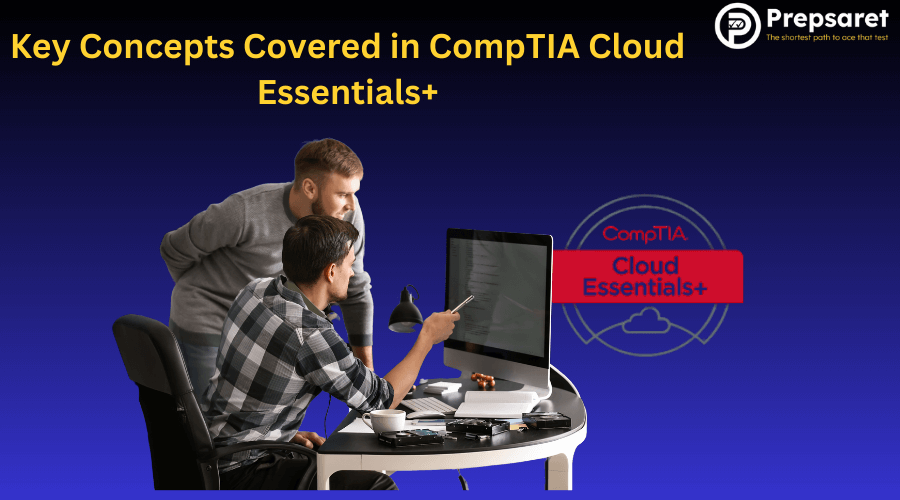In today’s tech-driven world, cloud computing is a game-changer for businesses, and understanding it can open doors to countless career opportunities. That’s where cloud certifications like CompTIA Cloud Essentials+ come in.
This entry-level certification is designed to equip individuals with the foundational knowledge needed to navigate the world of cloud computing. Whether you’re just starting or looking to solidify your expertise, CompTIA Cloud Essentials+ serves as an excellent stepping stone into the cloud industry.
But what exactly does the certification cover? In this article, we’ll dive into the key concepts covered in CompTIA Cloud Essentials+ and explore how it can help you gain a solid understanding of cloud services, security, governance, and more.
By the end of this guide, you’ll know exactly What is covered in CompTIA Cloud Essentials+, helping you determine if this certification is right for you!
Key Concepts Covered in CompTIA Cloud Essentials+
The CompTIA Cloud Essentials+ certification is your gateway to understanding cloud computing basics, which is crucial for anyone starting a career in cloud technologies.
To pass the exam, you need to be familiar with several key concepts covered in CompTIA Cloud Essentials+. These concepts form the foundation of cloud computing, and understanding them will help you navigate the cloud landscape with ease.
What are the core concepts in CompTIA Cloud Essentials+?
- Cloud Computing Fundamentals: First things first, you need to understand what cloud computing is all about. This includes the different cloud service models like IaaS, PaaS, and SaaS, and the different deployment models such as public, private, and hybrid clouds.
- Cloud Security Principles: Security is crucial when it comes to cloud computing. You’ll need to understand how to protect data in the cloud and the security best practices that help safeguard cloud environments.
- Governance and Compliance: You’ll also dive into cloud governance, which covers the policies and regulations that govern cloud use. Understanding compliance in the cloud is important for ensuring data privacy and security.
- Cloud Cost Management and Optimization: Cloud is cost-effective, but only if you manage it right. You’ll learn how to optimize cloud costs and manage cloud resources efficiently.
- Business Continuity: Cloud computing is often used for ensuring business continuity. You’ll need to know how cloud services help with disaster recovery and keeping a business running smoothly in case of an unexpected event.
- Risk Management: Finally, understanding risk management in the cloud is key. You’ll learn how to assess and manage risks in cloud environments to protect business operations.
To prepare for the CompTIA Cloud Essentials+ exam and pass it on your first try, it’s a great idea to enroll in the Prepsaret CompTIA Cloud Essentials+ Test Prep Program.
This program covers all the CompTIA Cloud Essentials+ key concepts, and it gives you access to practice questions that mirror the actual exam.
By going through this prep program, you’ll be well on your way to mastering the core concepts in CompTIA Cloud Essentials+ and boosting your chances of success.
The exam is structured around several key domains and objectives in CompTIA Cloud Essentials+. Mastering these will ensure that you’re ready to ace the exam and kickstart your career in cloud computing.
Cloud Computing Fundamentals
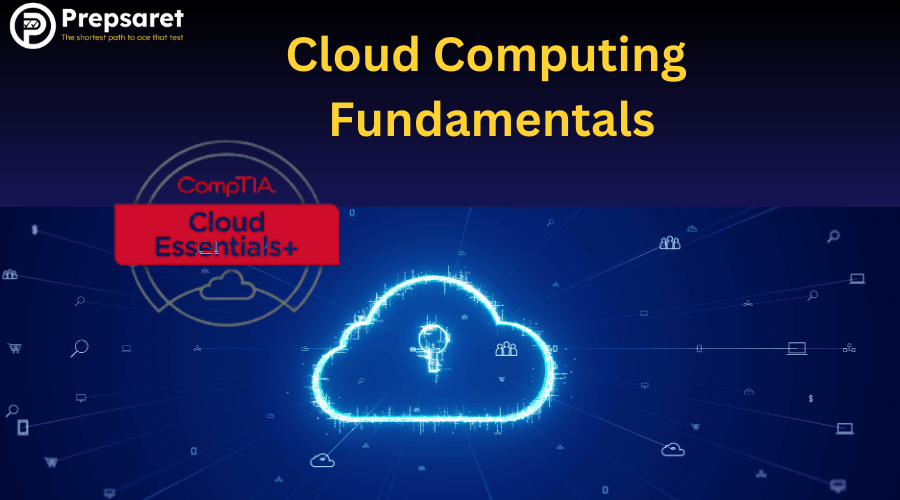
Cloud computing refers to delivering computing services—like storage, networking, and software—over the internet. It allows businesses to access IT resources without investing in expensive hardware.
The importance of cloud computing lies in its scalability, flexibility, and cost-efficiency, which help businesses grow and adapt quickly.
Cloud computing fundamentals are built on several key components, and understanding these is crucial for anyone pursuing the CompTIA Cloud Essentials+ certification. Here are the fundamental building blocks you need to know:
Cloud Architecture and Design
Cloud architecture refers to the structural design of cloud systems and applications. It includes the hardware, software, networking, and storage components that work together to deliver cloud services. You need to understand how cloud architecture is designed for scalability, reliability, and efficiency.
Cloud Deployment Models (public, private, hybrid)
Cloud services can be deployed in different ways, depending on the organization’s needs. There are three primary cloud deployment models:
- Public Cloud: Resources are owned and operated by a third-party provider and shared with other users. It’s cost-effective and flexible but may not meet all security and compliance needs.
- Private Cloud: Resources are used exclusively by one organization. It offers more control and security but requires a higher investment.
- Hybrid Cloud: A combination of both public and private clouds, offering businesses the flexibility to move workloads between them as needed.
Understanding these cloud deployment models and cloud architecture is key to mastering cloud computing fundamentals for the CompTIA Cloud Essentials+ certification.
Cloud Service Models (IaaS, PaaS, SaaS)
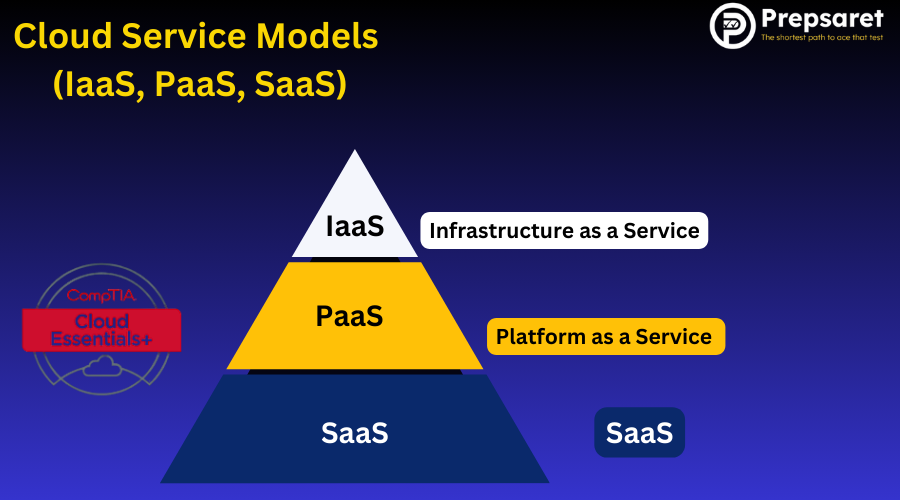
Another key concept covered in CompTIA Cloud Essentials+ is understanding the three main cloud service models.
These models define what parts of the computing stack you manage versus what your cloud provider handles.
Infrastructure as a Service (IaaS)
IaaS provides the raw building blocks of cloud computing:
- Virtual machines
- Storage
- Networks
- Security features
With IaaS, you’re responsible for managing the operating systems, applications, and data, while the provider maintains the physical hardware and virtualization layer.
Examples: Amazon EC2, Microsoft Azure VMs, Google Compute Engine
Platform as a Service (PaaS)
PaaS provides a platform for developing, testing, and deploying applications:
- Runtime environments
- Development tools
- Database services
- Web servers
With PaaS, you focus on your applications and data, while the provider handles the underlying infrastructure, operating systems, and middleware.
Examples: AWS Elastic Beanstalk, Google App Engine, Microsoft Azure App Services
Software as a Service (SaaS)
SaaS delivers complete applications that users can access through a web browser:
- Email services
- Customer relationship management (CRM)
- Office productivity suites
- Human resources applications
With SaaS, you simply use the software while the provider manages everything else, including the application itself.
Examples: Microsoft 365, Google Workspace, Salesforce
Understanding these service models is critical for making informed business decisions about cloud adoption, which is why it’s one of the key concepts covered in CompTIA Cloud Essentials+.
Check Out: CompTIA Cloud Essentials clo-002 pdf
Cloud Security Principles and Governance
Security is a major concern when moving to the cloud, and CompTIA Cloud Essentials+ ensures you understand the fundamentals of keeping data and applications safe.
Cloud Security Principles
The certification covers essential security concepts:
- Shared Responsibility Model: Understanding what security aspects are handled by the cloud provider versus the customer
- Data Protection: Methods for securing data both at rest and in transit
- Identity and Access Management: Controlling who can access cloud resources
- Network Security: Protecting cloud networks from unauthorized access
- Security Monitoring: Watching for suspicious activities and potential breaches
Cloud Governance and Compliance
You’ll also learn about the frameworks and regulations that guide cloud usage:
- Regulatory Requirements: Such as GDPR, HIPAA, and PCI DSS
- Compliance Frameworks: Including ISO 27001, SOC 2, and NIST
- Data Sovereignty: Understanding where your data is physically stored and the laws that apply
- Policy Management: Creating and enforcing cloud usage policies
Does CompTIA Cloud Essentials+ cover cloud security?
Yes, absolutely! Cloud security is one of the key concepts covered in CompTIA Cloud Essentials+.
While it doesn’t go into the technical implementation details that a security specialist would need, it provides the essential knowledge business professionals need to make informed decisions about cloud security.
Risk Management and Business Continuity in Cloud Environments
Understanding how to manage risks and ensure business operations continue even during disruptions is crucial for any organization using cloud services.
Risk Management in Cloud Environments
The certification covers:
- Risk Assessment: Identifying potential threats and vulnerabilities
- Risk Mitigation Strategies: Plans to reduce the impact of identified risks
- Vendor Risk Management: Evaluating cloud providers’ security postures
- Continuous Monitoring: Ongoing assessment of security controls
Business Continuity in Cloud Computing
You’ll learn about:
- Disaster Recovery Planning: Strategies to recover data and applications after a disaster
- Backup and Restoration: Methods for protecting data and ensuring it can be restored
- High Availability Options: Understanding how to minimize downtime
- Service Level Agreements (SLAs): Defining acceptable service levels with providers
The CompTIA Cloud Essentials+ exam content emphasizes the importance of both proactive risk management and reactive disaster recovery to ensure business resilience in the cloud.
Check Out: How to Prepare for the CompTIA Cloud Essentials+ Exam
Cloud Cost Management and Optimization
Another key concept covered in CompTIA Cloud Essentials+ is understanding the financial aspects of cloud computing, which is critical for businesses to maximize their cloud investments.
Understanding Cloud Costs
The certification covers:
- Cloud Pricing Models: Pay-as-you-go, subscription, and reserved instances
- Cost Components: Compute, storage, network, and additional services
- Hidden Costs: Data transfer, API calls, and support fees
Optimization Techniques
You’ll learn strategies to control and reduce cloud spending:
- Right-sizing Resources: Matching resource capacity to actual needs
- Scheduling: Turning off non-critical resources during off-hours
- Reserved Instances: Committing to longer-term usage for discounts
- Spot Instances: Using excess capacity at lower prices
- Monitoring and Reporting: Tracking expenditure and identifying waste
Understanding these financial aspects helps organizations avoid unexpected costs and make the most of their cloud budgets, making it one of the essential key concepts covered in CompTIA Cloud Essentials+.
CompTIA Cloud Essentials+ Exam Details
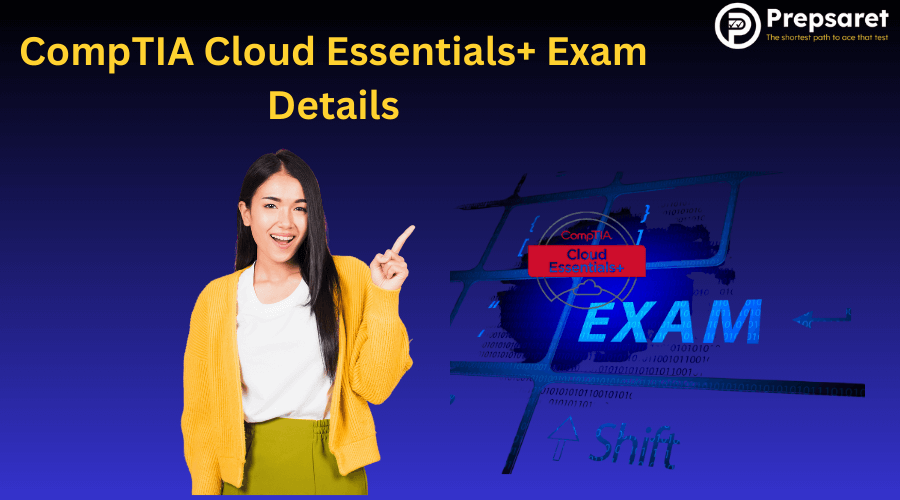
If you’re considering taking the CompTIA Cloud Essentials+ certification, it’s important to understand what the exam involves.
CompTIA Cloud Essentials+ Exam Content
The exam covers four main domains:
- Cloud Concepts (24%): This domain includes basic cloud principles, service models (IaaS, PaaS, SaaS), deployment models (public, private, hybrid), and cloud networking concepts.
- Business Principles of Cloud Environments (28%): It focuses on business value, impacts, stakeholders, and vendor relations in cloud adoption, including cloud migration approaches and benefits like identity access management and cloud-native applications.
- Management and Technical Operations (26%): This domain covers cloud resource management, DevOps in cloud environments, and financial aspects of cloud services, such as cost optimization and resource utilization.
- Governance, Risk, Compliance, and Security for the Cloud (22%): It emphasizes risk management, compliance, security concerns, and measures in cloud operations, including data sovereignty and regulatory requirements.
CompTIA Cloud Essentials+ Exam Cost
As of 2025, the exam costs:
- $138 (may vary by region)
- Discounts are available through CompTIA partners or academic programs
CompTIA Cloud Essentials+ Syllabus
The official syllabus includes the following CompTIA Cloud Essentials+ topics:
- Basic cloud computing concepts: Understanding cloud principles and models.
- Business aspects of cloud computing: Evaluating business use cases and financial impacts.
- Technical components of cloud computing: Understanding cloud architecture and operations.
- Cloud security and governance: Managing risk and compliance in cloud environments.
- Financial aspects of using cloud services: Understanding cloud pricing models and cost optimization techniques.
How to Study for CompTIA Cloud Essentials+ Exam?
To prepare effectively:
- Official CompTIA Study Materials: Including the official study guide
- Online Courses: Video courses that cover the key concepts
- Practice Tests: To familiarize yourself with the exam format
- Study Groups: Joining communities of others preparing for the same exam
Join the Facebook Community> Here
Prepsaret’s Test prep program is particularly effective as it covers all the key domains and objectives in CompTIA Cloud Essentials+ and provides extensive practice questions to ensure you’re fully prepared.
<Try our Free CompTIA Cloud Essentials+ Practice Questions to get a head start!.
CompTIA Cloud Essentials+ vs CompTIA Cloud+ Differences
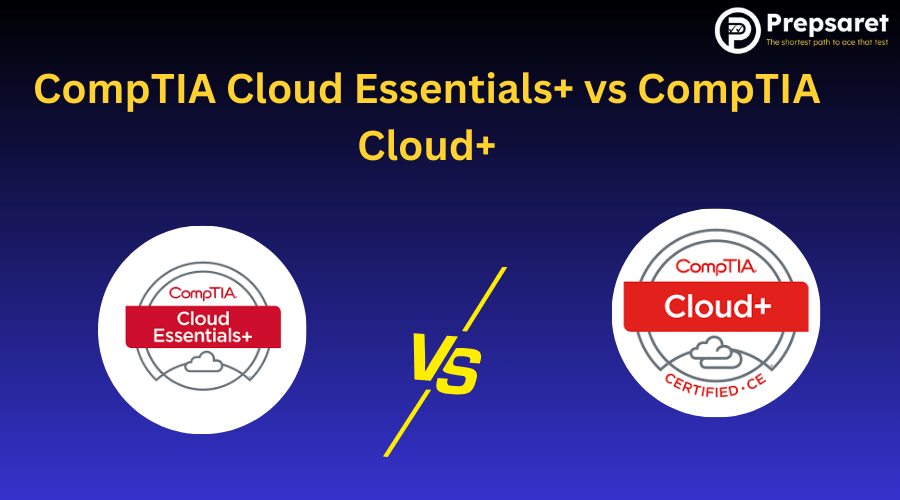
When exploring cloud certifications, you’ll often come across CompTIA Cloud Essentials+ and CompTIA Cloud+.
While both certifications focus on cloud computing, they serve different purposes and cater to distinct career paths.
CompTIA Cloud Essentials+ vs Cloud+ Differences
Here’s how they compare:
Audience Focus:
- Cloud Essentials+: Designed for business and non-technical professionals who need to understand cloud concepts from a business perspective.
- Cloud+: Targeted at technical IT professionals involved in implementing and managing cloud infrastructures.
Technical Depth:
- Cloud Essentials+: Focuses on conceptual understanding and business principles, providing a high-level overview of cloud computing.
- Cloud+: Emphasizes hands-on technical skills and implementation details, making it more suitable for those involved in the technical aspects of cloud management.
Prerequisites:
- Cloud Essentials+: No formal prerequisites are required.
- Cloud+: Typically recommended for individuals with 2-3 years of system administration experience.
Career Alignment:
- Cloud Essentials+: Suitable for business analysts, managers, and non-IT professionals who need to make informed cloud service decisions.
- Cloud+: More aligned with system administrators, network administrators, and cloud specialists who handle technical cloud operations.
Understanding these differences helps you choose the right certification for your career goals and technical background.
Career Opportunities Post-CompTIA Cloud Essentials+
Earning your CompTIA Cloud Essentials+ certification can open doors to various career opportunities in the cloud computing field.
CompTIA Cloud Essentials+ Jobs
The certification is beneficial for roles such as:
- Business Analyst: Assessing business needs and recommending cloud solutions
- Project Manager: Leading cloud migration or implementation projects
- Sales Representative: Selling cloud services and solutions
- Product Manager: Developing cloud-based products
- IT Procurement Specialist: Evaluating and purchasing cloud services
These roles don’t require deep technical knowledge but benefit from a solid understanding of cloud concepts and business implications.
CompTIA Cloud Essentials Salary
While salaries vary by location, experience, and specific role, professionals with cloud knowledge generally command competitive compensation:
- Entry-level positions with cloud knowledge: $50,000 – $65,000 USD
- Mid-level positions that utilize cloud expertise: $65,000 – $85,000 USD
- Management positions overseeing cloud initiatives: $85,000+ USD
The certification can also lead to salary increases in existing roles as organizations increasingly value cloud expertise across all departments.
FAQs
How Hard Is The CompTIA Cloud Essentials Exam?
The CompTIA Cloud Essentials+ exam is considered moderately challenging, requiring a basic understanding of cloud concepts and business principles. Preparation with study materials and practice questions can help ensure success.
What Are The Five Domains Of Objectives For The Cloud+ Exam?
CompTIA Cloud+ does not have five domains; it focuses on managing cloud operations, security, architecture, and DevOps. The exam objectives include cloud architecture, security, provisioning, and lifecycle management.
What Is The Difference Between CompTIA Cloud+ And Cloud Essentials?
CompTIA Cloud+ is for technical IT professionals focusing on hands-on cloud management, while Cloud Essentials+ is for business and non-technical professionals understanding cloud concepts and business implications.
Is CompTIA Cloud+ Worth IT?
CompTIA Cloud+ is valuable for IT professionals seeking to demonstrate technical expertise in cloud management, enhancing career opportunities and skills in cloud infrastructure.
What Is The Difference Between CCAK And CCSK?
The CCSK is a foundational certification that covers basic cloud security concepts, making it ideal for beginners or those seeking foundational knowledge. The CCAK, on the other hand, focuses on auditing cloud environments, building on foundational knowledge like CCSK.
Conclusion
CompTIA Cloud Essentials+ is an excellent choice for those new to cloud computing or professionals in business roles looking to grasp essential cloud concepts.
It covers important topics like cloud service models, security principles, and cost management, providing a solid foundation for your cloud career.
Does CompTIA Cloud Essentials+ expire? CompTIA Cloud Essentials+ does not expire; once earned, it remains valid for life.
If you’re ready to take the plunge, Prepsaret has everything you need to succeed. With study notes, practice questions, and a comprehensive prep program, you’ll be fully equipped to pass the exam.
Start your preparation today with Prepsaret’s Test Prep Program and take the first step toward your cloud career!

